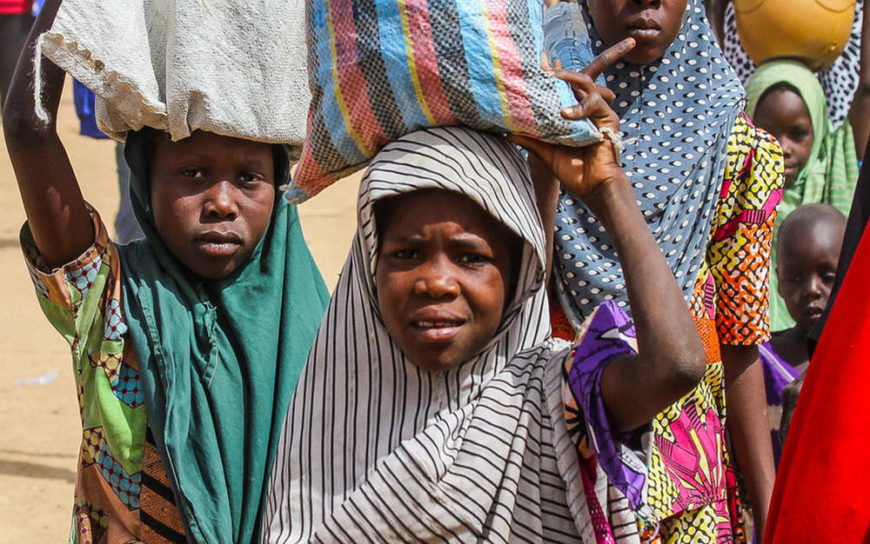Life Satisfaction and Hope in Conflict-Displaced Children: Influence of Individual Factors, Microsystem Factors and Humanitarian Interventions
Limited information exists on life satisfaction and hope of internally displaced children in conflict-affected areas. Using both the ecological and resilience frameworks on children’s well-being, this study investigates the associations between age, gender, parent-child relationship and livelihood support on life satisfaction and hope of conflict affected children. The study focuses on children aged 7-18 years (n=384) within two states in Northeast Nigeria using regression analysis. The children completed a self-report survey addressing diverse questions, such as age, gender, parent-child relationship, family type, relationship to household head, livelihood support, life satisfaction and hope. Parent-child relationship and living within an extended family system were positively associated with higher life satisfaction and higher levels of hope. Economic stress negatively influenced life satisfaction while livelihood support was positively associated with hope. Our findings suggest that intervention programs should focus on both livelihood factors as well as a positive parent-child relationship in order to produce a positive impact on the life satisfaction and hope of displaced children.
Population Review
Volume 60, Number 2, 2021
Type: Article, pp. 23-43
Life Satisfaction and Hope in Conflict-Displaced Children: Influence of Individual Factors, Microsystem Factors and
Humanitarian Interventions
Authors: Esther Ariyo, Dimitri Mortelmans and Edwin Wouters
Affiliations: Department of Sociology, Center for Population, Family and Health, University of Antwerp (Ariyo); Department of Sociology, Center for Population, Family and Health, University of Antwerp (Mortelmans); Department of Sociology, Center for Population, Family and Health,
University of Antwerp (Wouters)
Corresponding author/address: Esther Ariyo, Department of Sociology, Center for Population, Family and Health, University of Antwerp, Sint-Jacobstraat 2, 2000, Antwerp, Belgium;
email: esther.ariyo@uantwerpen.be
Abstract
Limited information exists on life satisfaction and hope of internally displaced children in conflict-affected areas. Using both the ecological and resilience frameworks on children’s well-being, this study investigates the associations between age, gender, parent-child relationship and livelihood support on life satisfaction and hope of conflict affected children. The study focuses on children aged 7-18 years (n=384) within two states in Northeast Nigeria using regression analysis. The children completed a self-report survey addressing diverse questions, such as age, gender, parent-child relationship, family type, relationship to household head, livelihood support, life satisfaction and hope. Parent-child relationship and living within an extended family system were positively associated with higher life satisfaction and higher levels of hope. Economic stress negatively influenced life satisfaction while livelihood support was positively associated with hope. Our findings suggest that intervention programs should focus on both livelihood factors as well as a positive parent-child relationship in order to produce a positive impact on the life satisfaction and hope of displaced children.
Keywords
Life satisfaction, hope, conflict–displaced children, subjective well-being, children, Nigeria
Conflict of interest statement: The authors declare that they have no conflict of interest.
Funding: This study did not receive any funding.
Acknowledgement: We acknowledge the assistance and contributions of TEARFUND Nigeria and the staff of CRUDAN, Adamawa state, Nigeria, towards the data collection of this study. For their enthusiasm/dedication, we also thank the survey participants who shared their experiences and field teams who conducted the interviews.
Ethical clearance: Ethical clearance was obtained from the University of Antwerp Ethics Committee for Social Science and Humanities (SHW_17_41_03), and the National Emergency Management Agency (NEMA), Nigeria (NEMA/PRF/179/III).
© 2021 Sociological Demography Press
MLA
Ariyo, Esther, et al. “Life Satisfaction and Hope in Conflict-Displaced Children: Influence of Individual Factors, Microsystem Factors and Humanitarian Interventions.” Population Review, vol. 60 no. 2, 2021, p. 23-43. Project MUSE muse.jhu.edu/article/798005.
APA
Ariyo, E., Mortelmans, D., & Wouters, E. (2021). Life Satisfaction and Hope in Conflict-Displaced Children: Influence of Individual Factors, Microsystem Factors and Humanitarian Interventions. Population Review 60(2), 23-43. https://www.muse.jhu.edu/article/798005.
Chicago
Ariyo, Esther, Dimitri Mortelmans, and Edwin Wouters. “Life Satisfaction and Hope in Conflict-Displaced Children: Influence of Individual Factors, Microsystem Factors and Humanitarian Interventions.” Population Review 60, no. 2 (2021): 23-43. muse.jhu.edu/article/798005.
Endnote
TY – JOUR T1 – Life Satisfaction and Hope in Conflict-Displaced Children: Influence of Individual Factors, Microsystem Factors and Humanitarian Interventions A1 – Ariyo, Esther A1 – Mortelmans, Dimitri A1 – Wouters, Edwin JF – Population Review VL – 60 IS – 2 SP – 23 EP – 43 PY – 2021 PB – Sociological Demography Press SN – 1549-0955 UR – https://muse.jhu.edu/article/798005 N1 – Volume 60, Number 2, 2021 ER –
Always review your references for accuracy and make any necessary corrections before using. Pay special attention to personal names, capitalization, and dates. Consult your library for more information on citing sources.




